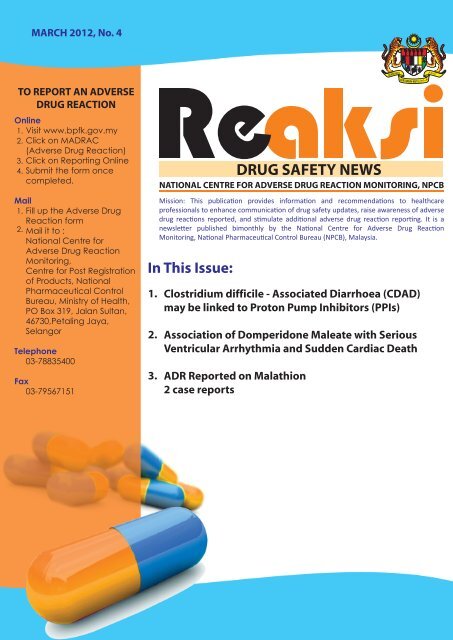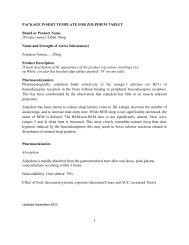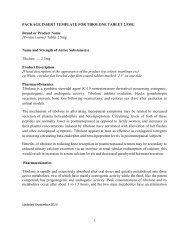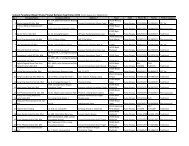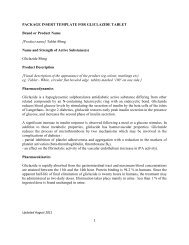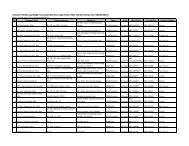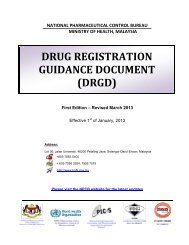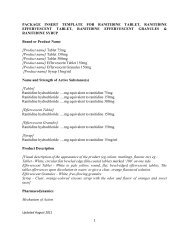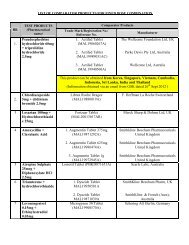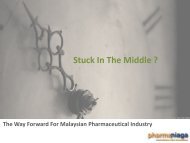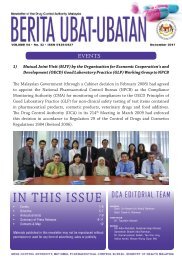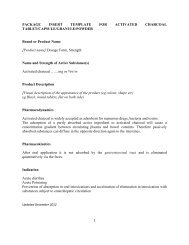DRUG SAFETY NEWS - BPFK
DRUG SAFETY NEWS - BPFK
DRUG SAFETY NEWS - BPFK
You also want an ePaper? Increase the reach of your titles
YUMPU automatically turns print PDFs into web optimized ePapers that Google loves.
MARCH 2012, No. 4TO REPORT AN ADVERSE<strong>DRUG</strong> REACTIONOnline1.2.3.4.Visit www.bpfk.gov.myClick on MADRAC(Adverse Drug Reaction)Click on Reporting OnlineSubmit the form oncecompleted.Mail1. Fill up the Adverse DrugReaction form2. Mail it to :National Centre forAdverse Drug ReactionMonitoring,Centre for Post Registrationof Products, NationalPharmaceutical ControlBureau, Ministry of Health,PO Box 319, Jalan Sultan,46730,Petaling Jaya,SelangorTelephone03-78835400Fax03-795671511.2.3.<strong>DRUG</strong> <strong>SAFETY</strong> <strong>NEWS</strong>NATIONAL CENTRE FOR ADVERSE <strong>DRUG</strong> REACTION MONITORING, NPCBMission: This publication provides information and recommendations to healthcareprofessionals to enhance communication of drug safety updates, raise awareness of adversedrug reactions reported, and stimulate additional adverse drug reaction reporting. It is anewsletter published bimonthly by the National Centre for Adverse Drug ReactionMonitoring, National Pharmaceutical Control Bureau (NPCB), Malaysia.In This Issue:Clostridium difficile - Associated Diarrhoea (CDAD)may be linked to Proton Pump Inhibitors (PPIs)Association of Domperidone Maleate with SeriousVentricular Arrhythmia and Sudden Cardiac DeathADR Reported on Malathion2 case reports
Clostridium Difficile - Associated Diarrhoea (CDAD) may be linked to ProtonPump Inhibitors (PPIs)PPIs are used to treat conditions suchas gastro esophageal reflux disease(GERD), stomach and small intestineulcers, and inflammation of theesophagus.Clostridium difficile (C. difficile) is abacterium that can cause diarrheathat does not improve. Symptomsinclude watery stool, abdominalpain, and fever, and patients may goon to develop more serious intestinalconditions. The disease can also bespread in hospitals.Although other predisposing factorslike advanced age, chronic underlyingmedical conditions and concomitantbroad spectrum antibiotics couldincrease the risk of CDAD, based on aUS Food and Drug Administration (USFDA) review of published papers, therole of PPIs cannot be definitivelyruled out and patients who have oneor more risks factors may haveserious outcomes from CDAD withconcomitant PPIs use.In MalaysiaThere are 69 PPIs registered inMalaysia. Since year 2000, there are14 diarrhoea cases reported to theNational Centre for ADR Monitoring.It is believed that such cases areunder-reported.Advice for healthcare providers:PPIs should be prescribed at thelowest dose and shortest duration oftherapy appropriate to the conditionbeing treated.Advise patients to seek immediatecare if they experience watery stoolthat does not go away, abdominalpain, and fever while taking PPIs.A diagnosis of CDAD should beconsidered for any patient who hasrisk factors for CDAD and who haspersistent or severe diarrhoea.Any adverse events suspected to beassociated with the use of PPIs shouldbe reported to the National Centre forADR Monitoring.Association of Domperidone Maleate with Serious Ventricular Arrhythmia andSudden Cardiac DeathIn March 2012, Health Canadainformed healthcare professionalsthat domperidone should beinitiated at the lowest possible dosein adults. Recent epidemiologicalstudies have shown that the use ofdomperidone may be associatedwith an increased risk of seriousventricular arrhythmias or suddencardiac death, particularly in patientstaking daily doses greater than 30mgand in patients older than 60 years ofage.Health Canada’s communication wasalso based on the results of apopulation-based case-control studyconducted in the Integrated PrimaryCare Information database in theNetherlands and a nestedcase-control study performed in thelinked administrative databases ofSaskatchewan Health.In MalaysiaThere are 16 registereddomperidone products in Malaysia.Since year 2005, the National Centrefor ADR Monitoring has received 8reports related to skin disorders, CNSdisorders and GI disorders. No reportwas associated with seriousventricular arrhythmias, suddencardiac death or other cardiacevents.The risks of serious ventriculararrhythmias or sudden cardiac deathmay be higher in patients taking dailydoses of more than 30 mg and inpatients older than 60 years of age.Domperidone should be initiated atthe lowest possible dose, which maybe adjusted upward with caution toachieve the desired effect as needed.ADR Reported on Malathion: 2 case reportsIn addition, the expected benefit ofan increased dose should outweighthe potential risks.Patients should be advised to seekprompt medical attention if theyexperienced signs or symptoms of anabnormal heart rate or rhythm suchas syncope, dizziness, palpitations orseizure which occur duringtreatment with domperidone.Domperidone should be avoided inpatients who are taking concomitantmedication known to cause QTprolongation (such as ketoconazoleand erythromycin).Any adverse events suspected to beassociated with the use ofdomperidone should be reported tothe National Centre for ADRMonitoring.The National Centre for Adverse DrugReactions Monitoring has received 2reports on Malathion as follows:1) A 3 year old child developedvomiting, severe abdominal painand fit-like symptoms 10 minutesafter applying a malathionshampoo for head liceinfestations. The child washospitalised for thoroughobservation. The abdominal painattacks occurred every 20 to 30minutes and lasted for 2 daysfrom onset2) Similarly, another case which wasreported in year 2011, relates toa 34 year old man whodeveloped nausea, vomiting anddiarrhoea within one hour afterusing a malathion product forscabies. The malathion productwas discontinued and allsymptoms resolved.Editorial comment: Malathion is ano r g a n o p h o s p h a t eparasympathomimetic which bindsirreversibly to cholinesterase.It isused in various industries and at lowdoses, malathion can also be usedexternally in the treatment of headlice and scabies. The WHO Databasecontains 18 reports of vomiting, 27reports of nausea, 9 reports ofabdominal pain and 10 reports ofdiarrhoea.Advice for healthcare providers:Counsel patients to recognize thesigns and symptoms of adversereactions for malathion and advisethem to seek medical attentionpromptly if they experience any of theabove symptoms.Any adverse events suspected to beassociated with the use of malathionshould be reported to the NationalCentre for ADR Monitoring.


